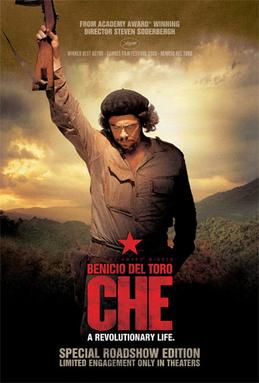Few historical figures stir up as much as controversy as revolutionary Ernesto 'Che' Guevara, an Argentinian man who fought with Fidel Castro in the Cuban revolution. Some look at him as an idealist revolutionary, someone to look up to for having fought oppression. Others look to him as a murderer, an individual one step above the dirt. Any movie about Che's life is then taking on quite a mission. Here's the review of the first half of director Steven Soderbergh's two-part movie about the infamous revolutionary, 2008's Che: Part One.
Working with fellow revolutionaries in 1956 Mexico, Ernesto Guevara (Benicio Del Toro), known as Che to his friends, has become fast friends with Fidel Castro (Demian Bichir), a Cuban national hoping to overthrow the oppressive Batista regime. With a group of just 80 followers, Castro and Guevara sail for Cuba, hoping to start a revolution from the ground up. The effort is slow and plodding, but they begin to see results. The cause grows and expands as more Cubans come to fight with the revolutionaries trying to overthrow not just the actual government, but the idea of what the government has become. Months and years pass, but the cause seemingly cannot be stopped with Havana and Batista as the end-game.
How do you start an argument online? Form an opinion, publish it in some way and let people immediately say 'No, you're wrong.' No movie about a divisive individual such as Che Guevara will please everyone. I've long been fascinated by the man without knowing much about him, but an IMDB poster of all people made an interesting point of all place (go figure). Some portray Che as good, others as bad. Wouldn't it make sense then that he was somewhere in between? Soderbergh leans more toward a positive portrayal (through Part 1 at least), but more than positive or negative, I think the objective was to show Guevara as a human being. He's not scum of the Earth, nor is he a perfect individual without flaws. He is a person if a somewhat idealistic individual.
As far as actors currently working in Hollywood go, I'm hard pressed to come up with too many that are better than Benicio Del Toro. His performance -- like the film itself -- as Che is a veritable minefield. There is no way to play this man without stirring up emotions, both positive and negative, among moviegoers. Soderbergh's film (through the 1st part at least) didn't seem too interested in taking a judgmental stance one way or another so Del Toro just gets to play the man. He is intelligent, well-spoken, a quiet but highly effective leader, and a man obsessed with revolution (and it doesn't hurt that Del Toro physically is a spot-on match for Che). In the process he performs actions that even now are controversial. It's an effective part if not a great part. Again, I come back to the movie on the whole, not just his performance.
Soderbergh's intention doesn't seem to be vilifying or making Guevara a hero. That's good. On the other hand, it doesn't take much of a stance at all. It feels instead like a fly on the wall documentary. Brief snippets/asides try to illustrate the bigger picture -- Castro, Cuba, Batista, the U.S. involvement -- but it is handled so quickly that it doesn't leave an impression at all. At 136 minutes, the movie is sometimes tedious and repetitious. It is a story about the growing Cuban revolution, and what do we see? Lots of jungle scenes, lots of walking through jungle scenes, lots of Che and his fellow officers addressing revolutionaries about their effort. Maybe Soderbergh just wanted to bring to life the revolution without trying to shove a message down our throats, but having no message at all doesn't work as well as it could have been.
Now those are all issues that I had with the movie, but there were positives, including Del Toro's performance. Soderbergh is a talented director to begin with, and when I think of his movies I think of style. A real-life style, a flair. 'Che' uses a framing device of Guevara visiting New York City and delivering a speech at the United Nations in 1964, the story bouncing between the visit and the fighting in Cuba between 1956-1959. The NYC scenes are shot in a grainy black and white, the Cuban jungle in vivid colors. Title cards introduce locations and times, and Soderbergh's camera always makes it a visually interesting movie to watch if not necessarily a story-driven interesting. Composer Albeto Iglesias' score is a gem, covering multiple genres and types of music that fit the story perfectly. Stylistically, 'Che' is an unquestioned winner.
Because of the almost free-flowing, story-less plot, the characters drift in and out, limiting their effectiveness. Bichir as Castro is a high point, more fiery and outwardly emotional in his revolutionary methods (if equally driven) as Che is. Catalina Sandino Moreno plays Aleida, a young revolutionary who joins the fighting as a guide for Che as the fighting nears Cuba's major cities. Rodrigo Santoro, Edgar Ramirez, and Santiago Cabrera play some of Che's fellow officers and revolutionaries, all with the potential for cool characters, but they end up being interchangeable. Also look for Julia Ormond as an American journalist interviewing Che during his NYC visit. This is definitely Del Toro's movie though.
Certain moments are highly effective, much of them coming late as Batista's regime starts to crumble. A half-hour plus is spent on the vicious street fighting in Santa Clara, and these battle sequences are effective in their reality. Cases of handfuls of revolutionaries fighting handfuls of army soldiers in the empty streets is tense and uncomfortable. The movie on the whole though is hit or miss with its fair share of flaws that I hope Part II fixes some. Review to come in a day or so.
Che: Part One <---trailer (2008): ** 1/2 /****


No comments:
Post a Comment